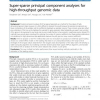Free Online Productivity Tools
i2Speak
i2Symbol
i2OCR
iTex2Img
iWeb2Print
iWeb2Shot
i2Type
iPdf2Split
iPdf2Merge
i2Bopomofo
i2Arabic
i2Style
i2Image
i2PDF
iLatex2Rtf
Sci2ools
BMCBI
2010
2010
Super-sparse principal component analyses for high-throughput genomic data
Background: Principal component analysis (PCA) has gained popularity as a method for the analysis of highdimensional genomic data. However, it is often difficult to interpret the results because the principal components are linear combinations of all variables, and the coefficients (loadings) are typically nonzero. These nonzero values also reflect poor estimation of the true vector loadings; for example, for gene expression data, biologically we expect only a portion of the genes to be expressed in any tissue, and an even smaller fraction to be involved in a particular process. Sparse PCA methods have recently been introduced for reducing the number of nonzero coefficients, but these existing methods are not satisfactory for high-dimensional data applications because they still give too many nonzero coefficients. Results: Here we propose a new PCA method that uses two innovations to produce an extremely sparse loading vector: (i) a random-effect model on the loadings that leads to an...
| Added | 08 Dec 2010 |
| Updated | 08 Dec 2010 |
| Type | Journal |
| Year | 2010 |
| Where | BMCBI |
| Authors | Donghwan Lee, Woojoo Lee, Youngjo Lee, Yudi Pawitan |
Comments (0)

